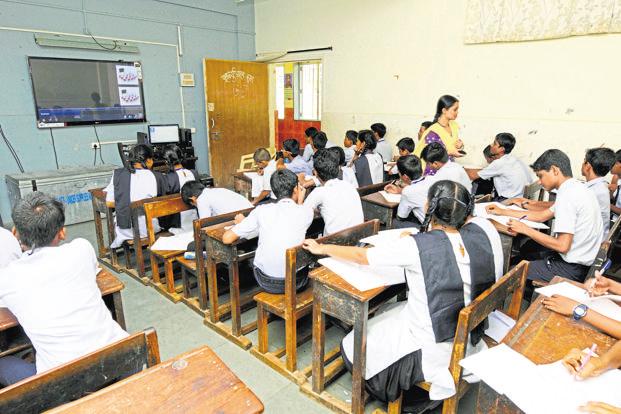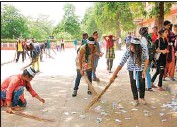Machine Learning can transform education
India needs a
massification and vocationalization of higher education at a cost that
only online learning can do. This needs machine learning
Last Published: Mon, Mar 26 2018. 12 42 PM IST

Indian
online education is held back by regulatory cholesterol that
distinguishes between distance and online education. Photo: Abhijit
Bhatlekar/Mint
Futurist
Arthur C. Clarke wrote, “Any sufficiently advanced technology is
indistinguishable from magic.” The magic of software (giving data and
rules to get answers) is often confused with the magic of machine
learning (giving data and answers to get rules) but it is machine
learning not software that is transforming the world of computer chess.
So
far, computer chess programs codified the actions of the best human
players and inevitably pivoted around the strategy of “material”,
wherein the number and value of pieces mattered most. But recently,
AlphaZero playing Stockfish counter-intuitively sacrificed a bishop for a
pawn. Reports suggest AlphaZero taught itself chess from scratch in
just four hours by playing against itself and rejected human rules
developed over centuries.
As it started with only the basic
rules, researchers suggest that its lack of knowledge of human chess
history may have enabled AlphaZero to see the game in a fresh way. We’d
like to make the case that machine learning is transforming online
education, but Indian online education is held back by regulatory
cholesterol.
Before diving into online education, let’s
reflect on challenges in education. Knowing must shift to learning
because Google knows everything. Metrics need shifting from inputs to
outcomes because only money is not working. Differentiation and
personalization are not about making things easier for children but
making learning accessible by tapping into motivations and abilities.
Assessment needs to shift from annual exams to regular feedback.
Teachers knowing content is not the same as their ability to create
learning.
There is an element of eat your spinach in education,
but schools largely work for front-row students. Lifelong learning needs
a continuum between prepare, repair and upgrade. Employability is an
objective. Timetables are an industrial-era model of one size fits all
that blunt choices and learner agency. Most importantly, if you think
formal education is everything, then just look at the president of the
US.
Many educators agree online learning can transform education,
but they don’t know how. Textbook and PowerPoint repackaged
e-learning—the digital equivalent of paving the cow path rather than
building a highway—mean that, so far, online offerings have not been
able to blunt the obvious downsides of physical classrooms (one size
fits all, huge costs, uneven teacher quality, etc.) despite obvious
advantages (teaching with different speeds to people with different
backgrounds and different starting points, class of one, cost,
on-the-go, on-demand, crowdsourced, gamified, etc.).
We
believe that the massification of machine learning could be the missing
ingredient—enabling personalization, flip classrooms, rethinking
assessments, enabling non-conventional credentialing, etc.
Personalization via intelligent tutor systems that track “mental steps”
and modify feedback, exercises, explanations and intervention to promote
self-regulation, self-monitoring and self-explanation would
revolutionize engagement.
A recursive and real-time meta-analysis
of learning outcomes across students, cohorts, schools would
considerably improve the efficacy of flip classrooms (where classrooms
are used for discussions and students finish the lecture and learning in
advance). Natural language, computer vision, and deep learning could
answer student questions.
These systems are infrastructure to
improve the signalling value of non-conventional or micro-credentialing,
which in turn would discover the cognitive, behavioural and affective
preferences for each learner. The biggest impact would be in assessment
by moving it from an event to a process and reducing its labour
intensity; for instance, tools like Sochobots, Lingolens and Gradescope
use computer vision and machine learning to grade students’ work (even
stuff like essays).
However, Indian online education is
held back by regulatory cholesterol that distinguishes between distance
and online education. E-commerce would never have happened if financial
regulators had insisted on separating the offline and online. UPI/BHIM
have gone from 0.1 million transactions in the month before
demonetization to 140 million last month; they will reach a billion in a
year. Payments for Indian consumers are almost free (marginal cost),
while in the US regulations have protected margins for private
platforms.
India’s regulatory issues include hubris (the ability
of regulators to anticipate all situations), micromanaging (including
defining the type of web links on your website) and continuous lobbying
because of poor state capacity to effectively regulate, supervise and
enforce. It is too late for evolution; we need a revolution under which
universities do not require permission to launch any online courses.
Regulators
can prescribe broad guidelines with a policy objective of creating
biodiversity and innovation in business and operating models that would
tackle the difficult trade-off between cost, quality and scale. Like
with most treatment of regulatory cholesterol, this revamped regulation
would be accompanied by improved supervision and strengthened consumer
protection. But drunk-driving is not an argument against cars and
regulations that ban or make online education difficult are silly.
Einstein
once said that if you judge a fish by its ability to climb a tree, it
will live its life believing it is stupid. Physical classrooms—because
of the limitations of time and space—often make this error. India needs a
massification and vocationalization of higher education at a cost that
only online learning can do. This needs machine learning. But before
that we need changes to our regulatory cholesterol.
The writers are with TeamLease Services and Schoolguru Eduserve, respectively.
First Published: Sun, Mar 25 2018. 11 38 PM IST
Source: LiveMint dated 26/03/2018







